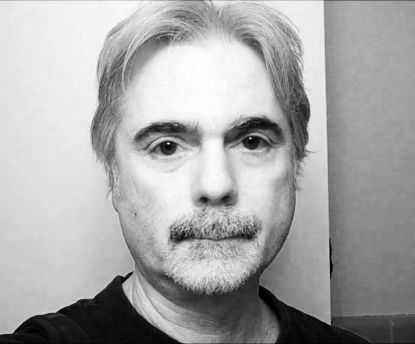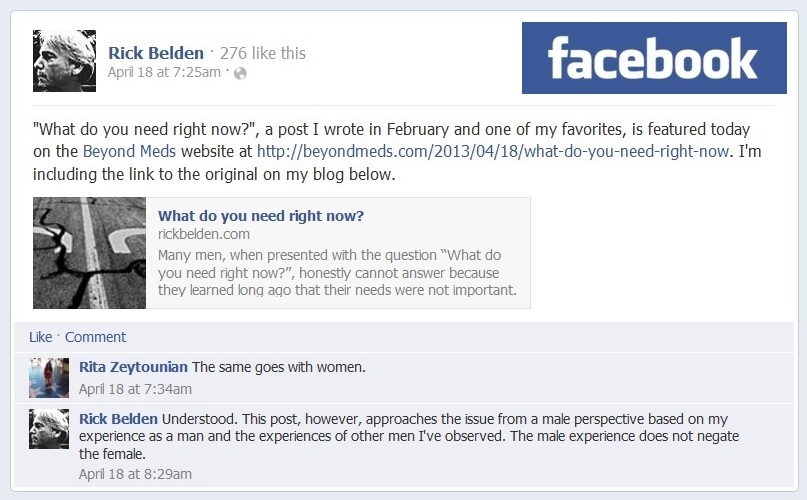A Conversation with Rick Belden: Obstacles to Awareness of Men's Issues
| Dan Bolton 12/08/2013 |
 Rick Belden
Rick Belden
Recently I had a very inspiring Twitter chat with Rick Belden, a true thought leader in the field of masculine psychology and men’s issues. I have the utmost respect for his work, and his blog is a source of energy and inspiration for me when I am feeling beleaguered by the ups and downs of trying to promote the message about the importance of men’s issues and influence the evolution of our concept of what it means to be a man.
Ever since I began dedicating my practice to working with men’s issues there has been a mixture of support and backlash from women around the idea that men’s health issues merit their own professional specialization. Movember was created to encourage a broader awareness of this need, but even raw statistics have not seemed to influence some women that men’s health issues are worthy of this level of concern and concentration.
This has been perplexing to me, especially in the cases where women who question this also have written articles online pointing out, for example, that the common thread in the shootings in the past year has been that each shooter has been male. How can such statements be made in conjunction with a resistance to men’s health issues meriting their own specialization?
Men have issues that are unique and relevant to being male. Even if men’s mental health issues appear exactly the same on a biological level as women’s, men’s perceptions of those issues simply are not. The way men think about mental health issues, emotions, and relationships is so qualitatively different than the way women think about them it truly merits a different approach. In addition, I am concerned at the lens through which men, men’s behavior, and men’s health issues are viewed, both by the broader public as well as by mental health professionals.
Recently I have come across an increasing number of men’s forums that serve as a place for men to have constructive discussion about men’s issues. This is a great step, but it is not enough. Men also need a comfortable and private place to speak about mental health and relationship issues with a professional who understands their specific outlook.
At its most basic level, to me, emotional and relational health is about being happy and comfortable in one’s life. My practice is focused on helping men to attain happiness and comfort in their lives.
Below is the impromptu chat the ensued between Rick and I on Thanksgiving outlining our experiences to the resistance to consideration of men’s issues as being worthy of it’s own specialization.
![]() Thanks Rick! Happy Thanksgiving to you as well! Keep on fighting the good fight!!! Your blog is very inspiring btw
Thanks Rick! Happy Thanksgiving to you as well! Keep on fighting the good fight!!! Your blog is very inspiring btw
![]() Thx Dan. I enjoy your work as well. You're making important and much-needed contributions to the growing dialogue about male experience.
Thx Dan. I enjoy your work as well. You're making important and much-needed contributions to the growing dialogue about male experience.
![]() Thank you... You're work keeps me going too. If only I had your writing skills! You have a great way with words...
Thank you... You're work keeps me going too. If only I had your writing skills! You have a great way with words...
![]() Thank you, Dan. Much appreciated. I guess we all help each other keep at it one way or another. That's a good thing for men to do!
Thank you, Dan. Much appreciated. I guess we all help each other keep at it one way or another. That's a good thing for men to do!
![]() That's for sure! Sometimes I get flack from women and wonder, but then I read your stuff and it brings me back to how important our work is
That's for sure! Sometimes I get flack from women and wonder, but then I read your stuff and it brings me back to how important our work is
![]() I get worn down, too, mostly by the massive indifference I see to men's reality and concerns. But as you said the work always calls me back.
I get worn down, too, mostly by the massive indifference I see to men's reality and concerns. But as you said the work always calls me back.
![]() BTW it's hard for me to see anything in what you share that would warrant complaints from women. You're pretty balanced in your approach.
BTW it's hard for me to see anything in what you share that would warrant complaints from women. You're pretty balanced in your approach.
![]() One woman on LinkedIn polices all my posts. Others comment "Women too" (as if men should not have their own forum of support).
One woman on LinkedIn polices all my posts. Others comment "Women too" (as if men should not have their own forum of support).
![]() I try to be balanced to help men see women's POV. Good to know for men at times. I also have a lot of female readers
I try to be balanced to help men see women's POV. Good to know for men at times. I also have a lot of female readers
![]() Yes, I get the "women too" reaction fairly often. Example and my response:
Yes, I get the "women too" reaction fairly often. Example and my response:

![]() Regardless of any push back, about 50% of my readers and followers are female. I find that both validating and encouraging.
Regardless of any push back, about 50% of my readers and followers are female. I find that both validating and encouraging.
![]() Good response... I also do receive a lot of support and encouragement from women. It is like there is a split in perspectives, by what? Don't know what the split is in world view between the women who are supportive vs. argumentative.
Good response... I also do receive a lot of support and encouragement from women. It is like there is a split in perspectives, by what? Don't know what the split is in world view between the women who are supportive vs. argumentative.
![]() Well my personal observation is that the argumentative ones break down into two categories that often overlap:
Well my personal observation is that the argumentative ones break down into two categories that often overlap:
![]() (1) women who've been heavily influenced by gender feminism (as opposed to equity feminism); and
(1) women who've been heavily influenced by gender feminism (as opposed to equity feminism); and
![]() (2) women who've not done much or any personal work to explore and own their own psychological shadow material, i.e., they project a lot on men.
(2) women who've not done much or any personal work to explore and own their own psychological shadow material, i.e., they project a lot on men.
![]() Second category includes women who've been abused, traumatized, etc and haven't fully dealt with the aftermath, still easily triggered, etc.
Second category includes women who've been abused, traumatized, etc and haven't fully dealt with the aftermath, still easily triggered, etc.
![]() That makes a lot of sense. I can see their influence in the social narrative about men. All men walk a thin line of being perpetrators there
That makes a lot of sense. I can see their influence in the social narrative about men. All men walk a thin line of being perpetrators there
![]() Yes. That "latent perpetrator" tag hurts men, e.g.: "A male survivor's perspective on 'rape culture'"
Yes. That "latent perpetrator" tag hurts men, e.g.: "A male survivor's perspective on 'rape culture'"
![]() I do try to understand some women have been through trauma, which is another reason why I include balance...
I do try to understand some women have been through trauma, which is another reason why I include balance...
![]() Agreed. I keep the trauma angle in mind at all times (and I know it well from my own experience) but it shouldn't be used to shut men down.
Agreed. I keep the trauma angle in mind at all times (and I know it well from my own experience) but it shouldn't be used to shut men down.
![]() Definitely! Perpetrators and narcissists stay away from me. I encourage men, like you do, to open up to emotions and vulnerability...
Definitely! Perpetrators and narcissists stay away from me. I encourage men, like you do, to open up to emotions and vulnerability...
![]() Men who are true NPD (Narcissistic Personality Disorder) perpetrators run from me because of that reason. I get fired fast by men with NPD
Men who are true NPD (Narcissistic Personality Disorder) perpetrators run from me because of that reason. I get fired fast by men with NPD
![]() It's clear to any reasonable person that those men are not the majority. We can't close our eyes to all other men because of them.
It's clear to any reasonable person that those men are not the majority. We can't close our eyes to all other men because of them.
![]() Many men can benefit from the work we do... Maybe we could publish this conversation somehow???
Many men can benefit from the work we do... Maybe we could publish this conversation somehow???
![]() If you wanted to grab this convo and publish an edited version on your blog, I'd be okay with that.
If you wanted to grab this convo and publish an edited version on your blog, I'd be okay with that.
![]() I think it would be great! It's refreshing to see that two men can have this conversation spontaneously!
I think it would be great! It's refreshing to see that two men can have this conversation spontaneously!
I believe there is a long way to go with regard to creating the awareness men’s issues and the male perspective deserves. Hopefully the more men there are like Rick doing this work the more men will become aware that there is a professional niche that understands their needs and perspective which will lead them to seek out services when in need rather than isolating, which happens all too often.
References:
- What do you need right now?
- A male survivor’s perspective on "rape culture"
- Men and grief
- D.A. Sears – "What If He Cries?"
- The male wish list
Rick Belden is the author of Iron Man Family Outing: Poems about Transition into a More Conscious Manhood. His book is widely used in the United States and internationally by therapists, counselors, and men’s groups as an aid in the exploration of masculine psychology and men’s issues, and as a resource for men who grew up in dysfunctional, abusive, or neglectful family systems. His second book, Scapegoat’s Cross: Poems about Finding and Reclaiming the Lost Man Within, is currently awaiting publication. He lives in Austin, Texas.
More information, including excerpts from Rick’s books, is available on his website and blog. You can also find him on Facebook, Twitter, and YouTube.
If you like what you've read, you might also be interested in my free tele-seminar. The tele-seminar covers a wide range of men's issues and happens once a month. Sign up for the free tele-seminar below...
Subscribe to Dan Bolton, LMHC's mailing list (and access to the free tele-seminar)
